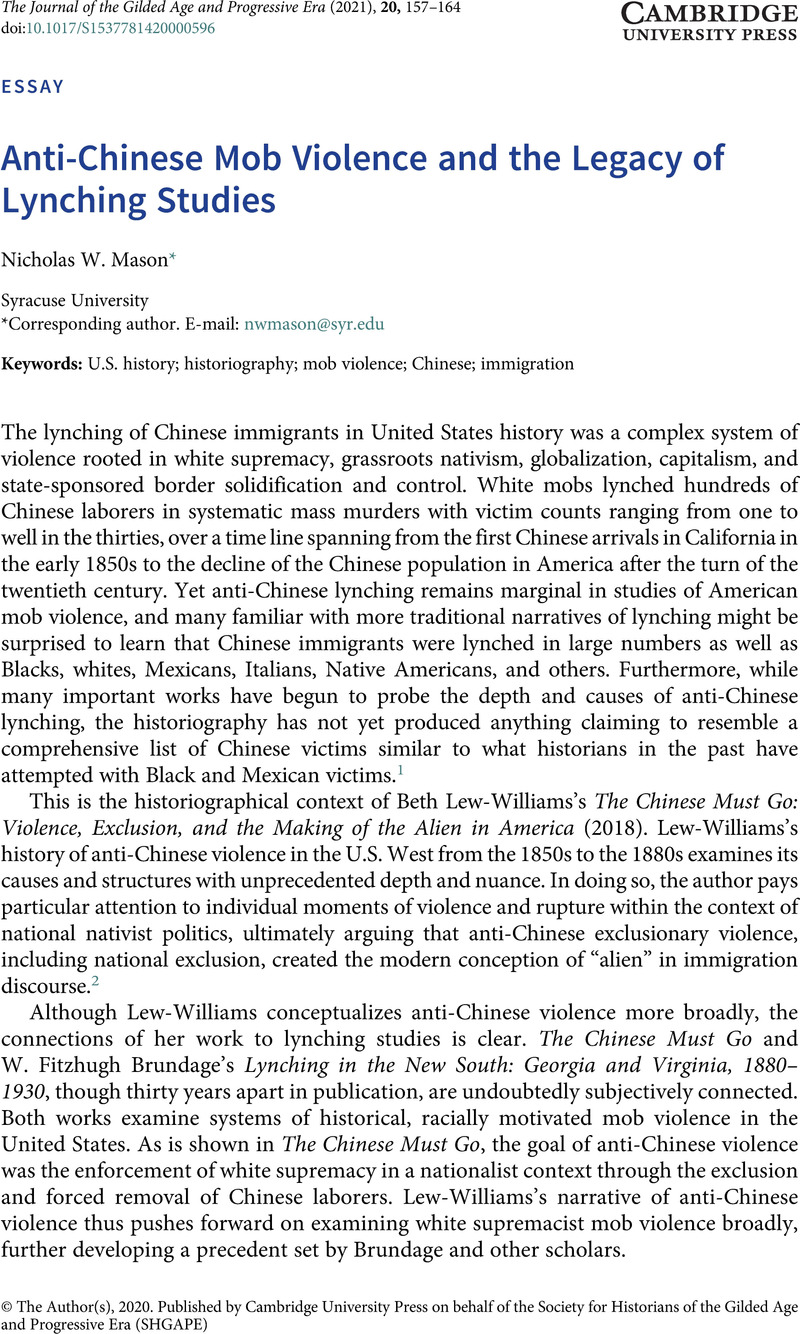Article contents
Anti-Chinese Mob Violence and the Legacy of Lynching Studies
Published online by Cambridge University Press: 01 December 2020
Abstract

- Type
- Special Forum: Lynching in the New South A Quarter of a Century Later
- Information
- The Journal of the Gilded Age and Progressive Era , Volume 20 , Issue 1 , January 2021 , pp. 157 - 164
- Copyright
- © The Author(s), 2020. Published by Cambridge University Press on behalf of the Society for Historians of the Gilded Age and Progressive Era (SHGAPE)
References
Notes
1 For examples of scholarly efforts to collect and catalog lynching incidents and their victims, see Brundage, W. Fitzhugh, Lynching in the New South: Georgia and Virginia, 1880–1930 (Urbana: University of Illinois Press, 1993)Google Scholar; Leonard, Stephen J., Lynching in Colorado,1859–1919 (Boulder: University Press of Colorado, 2002)Google Scholar; Pfeifer, Michael J., Rough Justice: Lynching and American Society, 1874–1947 (Urbana: University of Illinois Press, 2004)Google Scholar; Carrigan, William D., The Making of a Lynching Culture: Violence and Vigilantism in Central Texas, 1836–1916 (Urbana: University of Illinois Press, 2004)Google Scholar; Gonzales-Day, Ken, Lynching in the West, 1850-1935 (Durham, NC: Duke University Press, 2006)Google Scholar; Pfeifer, Michael J., The Roots of Rough Justice: Origins of American Lynching (Urbana: University of Illinois Press, 2011)Google Scholar; Pfeifer, Michael J., ed., Lynching Beyond Dixie: American Mob Violence Outside the South (Urbana: University of Illinois Press, 2013)CrossRefGoogle Scholar; and Carrigan, William D. and Webb, Clive, Forgotten Dead: Mob Violence against Mexicans in the United States, 1848-1928 (Oxford: Oxford University Press, 2013).Google Scholar
2 Lew-Williams, Beth, The Chinese Must Go: Violence, Exclusion, and the Making of the Alien in America (Cambridge, MA: Harvard University Press, 2018), 10–11.CrossRefGoogle Scholar
3 Brundage, Lynching in the New South, 15.
4 Lew-Williams, The Chinese Must Go, 10.
5 Brundage, Lynching in the New South, 9–10.
6 Lew-Williams, The Chinese Must Go, 19.
7 Brundage, Lynching in the New South, 8.
8 See Leonard, Lynching in Colorado; Gonzales-Day, Lynching in the West; Pfeifer, Lynching Beyond Dixie.
9 See Berg, Manfred, Popular Justice: A History of Lynching in America (Chicago: Ivan R. Dee, 2011).Google Scholar
10 See Pfeifer, Michael J., ed., Global Lynching and Collective Violence, Volume 1: Asia, Africa, and the Middle East (Urbana: University of Illinois Press, 2017)Google Scholar; Pfeifer, Michael J., ed., Global Lynching and Collective Violence, Volume 2: The Americas and Europe (Urbana: University of Illinois Press, 2017).Google Scholar
11 Brundage, Lynching in the New South, 7–8. For other examples of scholarly works on lynching that focus on the twentieth century, see Berg, Popular Justice; Gonzales-Day, Lynching in the West; Pfeifer, ed., Global Lynching and Collective Violence; Pfeifer, Rough Justice; Ward, Jason Morgan, Hanging Bridge: Racial Violence and America’s Civil Rights Century (Oxford: Oxford University Press, 2016).Google Scholar
12 William D. Carrigan, “The Strange Career of Judge Lynch: Why the Study of Lynching Needs to Be Refocused on the Mid-Nineteenth Century,” The Journal of the Civil War Era 7:2 (June 2017): 296.
13 See Stratton, David H., “The Snake River Massacre of Chinese Miners, 1887” in Smith, Duane A., ed., A Taste of the West: Essays in Honor of Robert G. Athearn (Boulder: University of Colorado Press, 1983)Google Scholar; Storti, Craig, Incident at Bitter Creek: The Story of the Rock Springs Chinese Massacre (Ames: Iowa State University Press, 1991).Google Scholar
14 Chang, Iris: The Chinese in America: A Narrative History (New York: Viking Penguin, 2003).Google Scholar
15 See Zesch, Scott, “Chinese Los Angeles in 1870–1871: The Makings of a Massacre,” Southern California Quarterly 90:2 (Summer 2008): 109–58CrossRefGoogle Scholar; Pfaelzer, Jean, Driven Out: The Forgotten War Against Chinese Americans (Berkeley: University of California Press, 2008)Google Scholar; Nokes, R. Gregory, Massacred for Gold: The Chinese in Hells Canyon (Corvallis: Oregon State University Press, 2009)Google Scholar; Zesch, Scott, The Chinatown War: Chinese Los Angeles and the Massacre of 1871 (Oxford: Oxford University Press, 2012)CrossRefGoogle Scholar; Zhu, Liping, The Road to Chinese Exclusion: The Denver Riot, 1880 Election, and Rise of the West (Lawrence: University Press of Kansas, 2013).Google Scholar
16 Lew-Williams, The Chinese Must Go, 5.
17 Lew-Williams, The Chinese Must Go, 3–5.
18 Lew-Williams, The Chinese Must Go, 6.
19 Lew-Williams, The Chinese Must Go, 6–7. Also see Pfaelzer, Driven Out.
20 Lew-Williams, The Chinese Must Go, 7.
21 See Ngai, Mae M., Impossible Subjects: Illegal Aliens and the Making of Modern America (Princeton, NJ: Princeton University Press, 2004)Google Scholar; McKeown, Adam M., Melancholy Order: Asian Migration and the Globalization of Borders (New York: Columbia University Press, 2008)Google Scholar; Ngai, Mae M., “Chinese Gold Miners and the ‘Chinese Question’ in Nineteenth Century California and Victoria,” Journal of American History 101 (Mar. 4, 2015): 1082–1105.CrossRefGoogle Scholar
22 Lew-Williams, The Chinese Must Go, 8.
23 Lew-Williams, The Chinese Must Go, 20.
24 Lew-Williams, The Chinese Must Go, 20–24.
25 Lew-Williams, The Chinese Must Go, 88.
26 Lew-Williams, The Chinese Must Go, 30–31.
27 Lew-Williams, The Chinese Must Go, 94–95.
28 Lew-Williams, The Chinese Must Go, 235–36.
29 Brundage, Lynching in the New South, 2–3.
30 Lew-Williams, The Chinese Must Go, 114–15.
31 Lew-Williams, The Chinese Must Go, 93.
- 1
- Cited by


